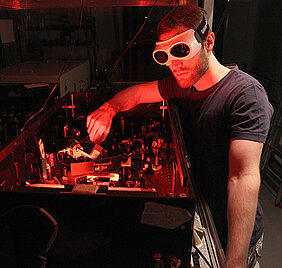Perfect light absorption
01.09.2015Physicists study how to achieve perfect absorption of light with the help of rough ultrathin films.

Light-absorbing films can be found in many everyday applications such as solar cells or sensors. They are used to convert light into electrical current or heat. The films literally trap the light. Although such absorber films are applied widely, scientists still do not know which mechanism permits the most efficient absorption of light.
A team of physicists at Bielefeld University, the University of Kaiserslautern, and the Julius Maximilian University of Würzburg (JMU) have now proved that the very efficient scattering of light in ultrathin rough films traps light until it is absorbed completely. The researchers are now (31.08.2015) publishing their findings in the journal Nature Photonics. This research can help to make thin absorber films even more efficient and thereby save energy.


